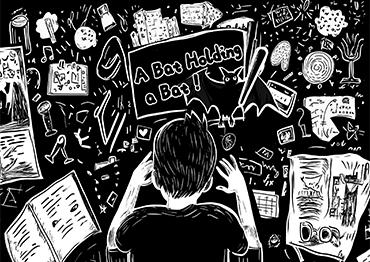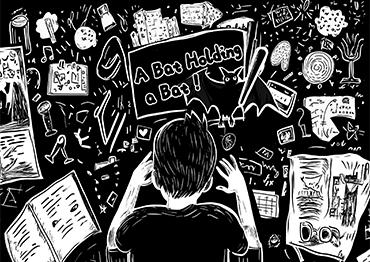Many educators noted that most parents neglect playing a role in guiding children in using internet language appropriately and critically.
“My parents don’t understand internet slang and memes at all. Since they don’t understand the language, they don’t care about it,” said Wu Yi, who studies at a university in Dalian, Northeast China’s Liaoning Province. His younger brother, a high school student in Guangzhou, has been using internet slang since middle school. He often says it at home in front of their parents.
“My parents were quite indifferent to my brother’s way of speaking. They just thought he was showing off,” Wu told our reporter. He added that some of the slang his brother uses is extremely offensive, such as xiao tang ren, a derogatory term used to insult those with Down syndrome. While Wu has tried to stop his brother from using such language, his efforts have been in vain.
Professor Zhou Yan emphasized that despite these issues, internet language has developed its own intrinsic vitality over the past three decades. “Embedded with people’s emotions, judgments and experiences, it is fundamentally a highly expressive language. By creating and using such language, people have formed a social consensus,” Zhou said.
“Of course, we should embrace positive and creative internet language to enrich our expressions. But we must also shield minors from internet jargon, slang and memes with vulgar, violent, indecent or discriminatory connotations,” said Huang Chuxin, secretary-general of the New Media Research Center at the Chinese Academy of Social Sciences. “While fostering the use of normative language, we should also protect linguistic diversity and avoid excessive interference.”
On September 30, 2024, the Ministry of Education issued a notice aimed at promoting the country’s linguistic and cultural heritage. Titled “Notice on Strengthening Standard Chinese Character Writing Education in Primary and Secondary Schools,” it requires teachers and students to avoid using improper abbreviations in formal writing.
In response, since late 2024, schools across China have implemented measures to guide children and teens in their language use. According to a report in the Yangtze Daily, since late October 2024, many primary schools in Wuhan, Hubei Province formally banned students from using internet slang and memes in both writing and public settings.
Banned expressions include the previously mentioned lao liu (“backstabber” or “creep”) and lao deng (“dirty old man”), as well as phrases combining Chinese and English, such as BBQ le (“barbecued”) and abbreviations born from keyboard shortcuts like “YYDS” (similar to “GOAT,” or “greatest of all time” in English) and “XSWL” (similar to “LMAO” or “laughing my ass off”).
Jiang Mei, a teacher of Chinese for 16 years at a public high school in Guangzhou, urged patience from both teachers and parents. “There are stages to every child’s development. If a child frequently uses improper internet slang in speech or writing, it doesn’t necessarily mean their language proficiency is poor or that their mind is corrupted – it’s unfair to make such judgments,” Jiang said.
Based on her observations, the frequency of using internet slang in public and in writing decreases significantly with age. High school students are less likely to use inappropriate language in formal contexts. “But in their daily conversations, they still use it quite often,” Jiang noted.

 Old Version
Old Version
